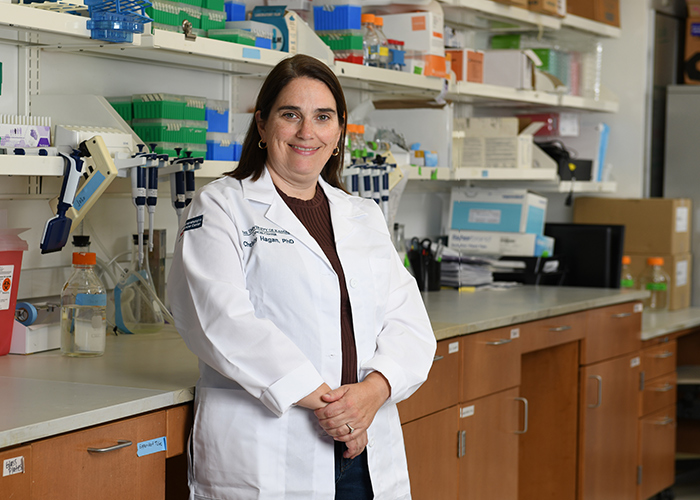Endometrial cancer, which affects the lining of the uterus, is the most common type of gynecologic malignancy. It is also one of the few cancers in the United States with both increasing incidence rates and decreasing survival rates over the last 20 years, according to the American Cancer Society.
“Because of the lack of knowledge about how best to treat endometrial cancer, we’re not helping the increased number of patients with endometrial cancer,” said Christy Hagan, Ph.D., a member of The University of Kansas Cancer Center’s cancer biology program and an associate professor of biochemistry and molecular biology at KU School of Medicine.
The prevalence of obesity, one of the biggest risk factors for endometrial cancer, has driven much of the rise in diagnoses. Meanwhile, treatment options have remained largely stagnant, and the disease is widely recognized to be underfunded and understudied.
Hagan is a project leader on a recently awarded five-year project program grant (P01) from the National Cancer Institute to study hormone therapy for endometrial cancer. P01 grants are long-term, complex grants that support multiple research projects across institutions that come together to answer a scientific question. The University of Utah, the University of New Mexico and the University of Iowa are the other institutions on the P01. This is the first P01 ever at KU Cancer Center, Hagen noted.
The researchers will focus on the use of progestins, a synthetic form of the hormone progesterone, to combat endometrial cancer. Progestins are most often used in birth control pills. They are also the only FDA-approved drugs to treat early-stage endometrial cancer, but their use is limited largely to women who cannot have surgery to remove the uterus and to younger women who want to preserve their fertility.
Despite being relatively effective, the study researchers believe these drugs are under-utilized because the most effective type of progestin is not known and studies link some of them to an increased risk of breast cancer.
“The question we are trying to answer is, which progestin is the best for treating endometrial cancer and which is the safest for the breast?” said Hagan.
The study will evaluate progestins both to treat existing disease and to prevent atypical endometrial hyperplasia (a precancerous condition in the uterus) from progressing to full-blown endometrial cancer.
One project in the study will test the effectiveness of different progestins on animal models and organoids, which are models made from uterine cancers removed from patients, evaluating which best inhibit cancer cell growth and division. Another project will study the molecular mechanisms behind the progestin activity, information that can help define which patient characteristics are correlated with the best response to the various progestins.
Hagan’s project will focus on safety, specifically examining the potential of different progestins to promote tumors in the breast, both in normal tissue and in tissue with early-stage mammary gland tumors. Using human tissue and animal models, her team will look at how the mammary glands change over time in response to different progestins.
They will test to see how the cells of the mammary glands in these models proliferate, or multiply and increase in number. Excessive proliferation increases the risk of breast cancer. They will also look to see if different progestins lead to a relatively rare form of breast cancer that arises in the lobules (milk glands) of the breast. When treated with progestin in the past, these cancers have tended to grow, progressing from tiny non-invasive tumors to invasive ones.
“In women who have gotten these progestins either through birth control pills or through hormone replacement therapy, and seen an increased risk of breast cancer, we think that those hormones, those synthetic progestins, likely fed early lesions to help them grow into big tumors,” said Hagan.
All of this work will form the basis for the final project under the P01, a clinical trial using the information analyzed about efficacy and safety, to test the progestins in women with newly diagnosed endometrial cancer or with precancerous atypical endometrial hyperplasia.
“Our hope is that funding from this grant will significantly impact a number of endometrial cancer patients by identifying which is the most effective and safest treatment for them,” said Hagan. “By having a team of scientists working together on this question, we hope to get those answers faster for our patients.”
